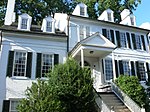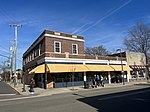Windsor Farms

Windsor Farms is a 20th-century neighborhood in Richmond, Virginia, of primarily Colonial Revival design. Designed in 1926, Windsor Farms is one of Richmond's first planned neighborhoods. It was designed to look like an English village, with curvy streets and English names like Dover, Canterbury, Berkshire, and so on. There are a variety of architectural styles, the most common being Colonial Revival and Cape Cod. Lots are anywhere from half an acre to 23 acres (93,000 m2). Windsor Farms has a couple of historical buildings, including Virginia House and Agecroft Hall. Windsor Farms borders Cary Street Road to the north, the Downtown Expressway to the east, the James River and several areas to the south, and the neighborhoods of Lockgreen and Westmoreland Place to the west. Historic houses in the neighborhood include Virginia House and Agecroft Hall, both moved from England in the 20th century. Another is "The Oaks" which was built by Benjamin Harrison IV in 1745 and moved from nearby Amelia County, Virginia in 1927. Several high-end, architecturally significant houses were designed by Virginia-born Duncan Lee and William Lawrence Bottomley of New York.
Excerpt from the Wikipedia article Windsor Farms (License: CC BY-SA 3.0, Authors, Images).Windsor Farms
Oxford Circle East, Richmond
Geographical coordinates (GPS) Address Nearby Places Show on map
Geographical coordinates (GPS)
| Latitude | Longitude |
|---|---|
| N 37.555555555556 ° | E -77.498333333333 ° |
Address
Oxford Circle East 203
23221 Richmond
Virginia, United States
Open on Google Maps






